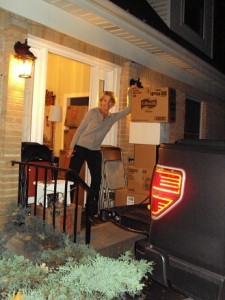Fall is a season of change. Children go back to school, college co-eds head back to campus, and many young adults sign new apartment leases. Each change involves packing up, rearranging all things familiar and, in some cases, making a major move.
Last week my sister and brother-in-law joined the relocation parade by moving from their suburban home of 40 years to downtown Chicago.
The buyer of their 5000+ square foot house was a young couple with a toddler and baby. After hunting in the area for a year, they toured Bervin and Mary’s home and fell in love with it the first time through. We puzzled over why such a small family would commit to such a large house, but gradually the pieces came together.
The young mother, on her second visit, made mention of the “Christian energy” throughout the rooms, commenting on the peaceful atmosphere. “It’s just what we’ve been looking for,” she said. Her husband asked if they could buy the 3’ X 4’ framed Scripture verse hanging over the front door: “Know thou the God of thy father, and serve him with a perfect heart and with a willing mind.”
At the real estate closing, the reason they chose a large home became clear. The buyers handed Mary a note of gratitude and described how they felt called to help missionaries and planned to use their extra rooms for that purpose.
It can be a challenge to leave the home where you’ve raised 7 children, but when the process became difficult, the testimony of these young buyers made it easier. As Mary said, “I can’t think of anyone else I’d rather have living in our home.”
Last summer Bervin and Mary offered housing to missionaries from Ireland. This family of 6 needed a place to stay for a month, and also needed a car. Bervin and Mary gave a thumbs-up to both requests, proving to be good examples of the scriptural instruction hanging in their entry. Their buyers will continue in this vein.
All of us can look back on multiple moves, and it’s a good idea to search for God’s plan in the progression; sometimes it’s as plain as an architect’s blueprint. Over four decades of time, because of Mary and Bervin’s willingness to serve, God used their home for his purposes in hundreds of ways. As they left that address, he moved along with them and is preparing a fresh blueprint with plans for use of their new home.
Yesterday Louisa and her cousin Marta made a move of their own, from their family homes to an apartment just north of the Loop. After unloading cars and pickups full of boxes, bins and beds, we gathered in their small living room and Bervin prayed, inviting God’s involvement in their new home.
And we know the Lord is ready with the perfect blueprint for two 20-somethings living in the heart of Chicago.
“Know thou the God of thy father, and serve him with a perfect heart and with a willing mind. If thou seek him, he will be found of thee.” (1 Chronicles 28:9)





